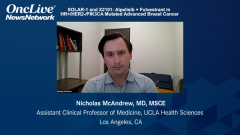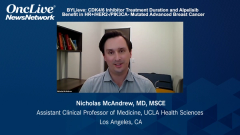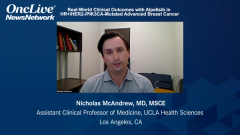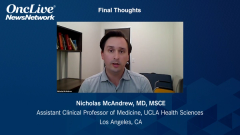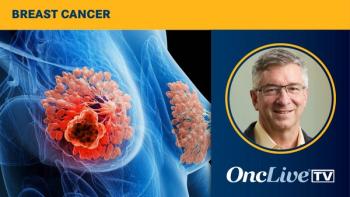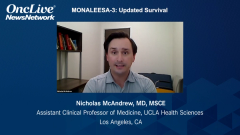
Real-World Clinical Outcomes With Alpelisib in HR+/HER2-/PIK3CA-Mutated Advanced Breast Cancer
Nicholas McAndrew, MD, MSCE, provides his perspective on real-world clinical outcomes using alpelisib in patients with HR+/HER2-/PIK3CA-mutated advanced breast cancer.
Episodes in this series

Nicholas McAndrew, MD, MSCE: Recently at the 2021 ASCO [American Society of Clinical Oncology] Annual Meeting, Dr Hope Rugo and colleagues presented their analysis looking at real-world data in patients with PIK3CA mutations receiving alpelisib. They performed this analysis by looking at the Flatiron database and cross-referenced it with genotyping information from FoundationOne with tumor and liquid biopsies. They were then able to identify patients who essentially fit SOLAR-1 criteria in terms of having previously received endocrine therapy and having a PIK3CA mutation, and were able to reconstruct a real-world, similar study of patients who had either received alpelisib and fulvestrant or fulvestrant alone.
What was interesting about this study is that they had looked at a host of different PIK3CA mutations, including PIK3CA mutations that weren’t included in patients who had enrolled in the SOLAR-1 trial. About 31% to 35% of all the patients identified who were eligible had a PIK3CA mutation, which is consistent with the approximately 40% of patients who have a PIK3CA mutation. About two-thirds, or 66%, of the patients had mutations that were seen in SOLAR-1; 14% had other mutations plus mutations that were also seen in SOLAR-1; and then 20% had mutations other than PIK3CA that were not included in SOLAR-1 and may have degrees of activation of PI3K or of sensitivity to alpelisib. This is important because it reflects the range of patients who are seen in the real-world setting, because not all patients have specifically the mutations that were enrolled in SOLAR-1.
When they looked at this overall population, including all patients with any kind of PIK3CA-activating mutation, they still found that there was improved real-world progression-free survival in patients who received fulvestrant and alpelisib. This helps us understand that in a real-world setting, looking at a host of mutations different from PIK3CA, we still see benefit with the addition of alpelisib on top of fulvestrant. That helps provide additional reassurance to clinicians who rarely see a patient who fits every single enrollment criteria into the trial the drug gained approval on.
Transcript edited for clarity.


